Kidney Stones in Adults and Ways of Their

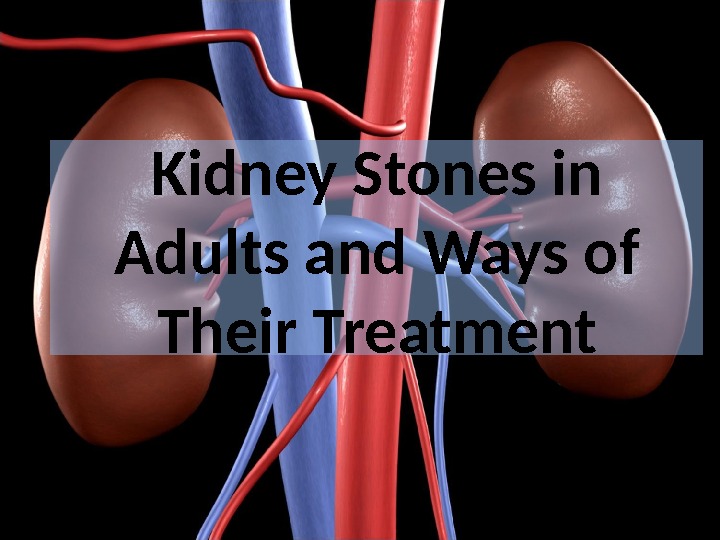
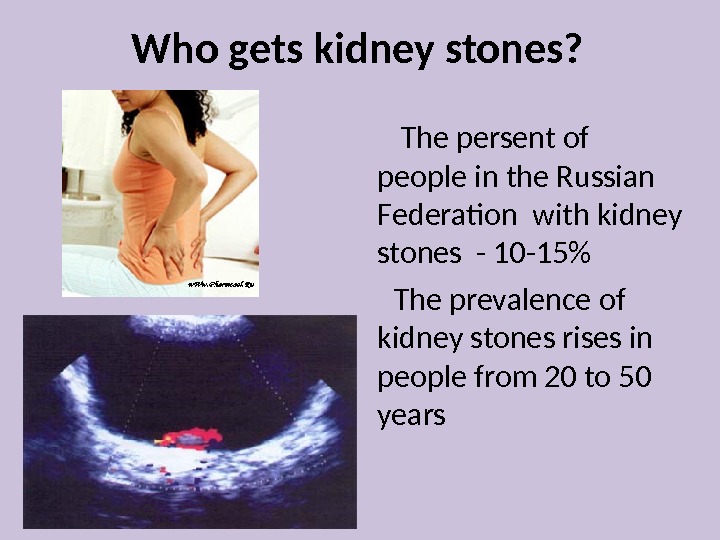
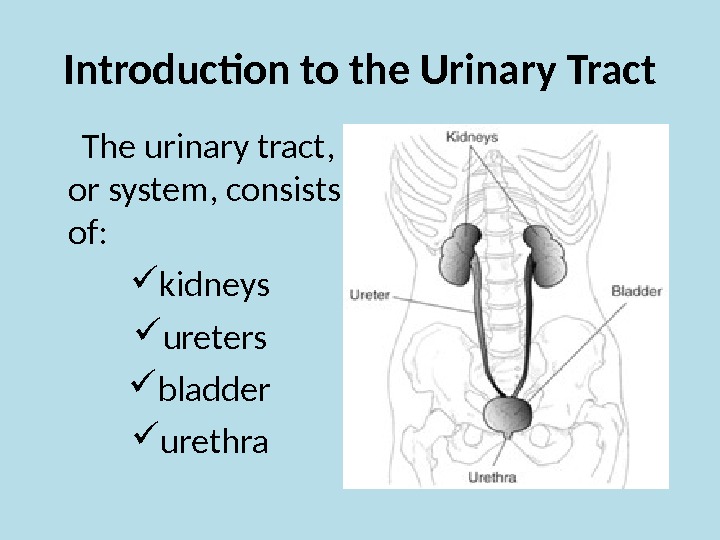
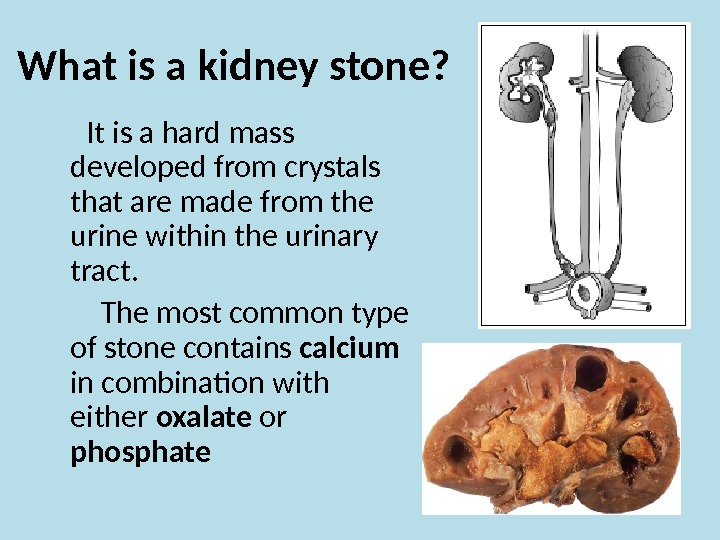
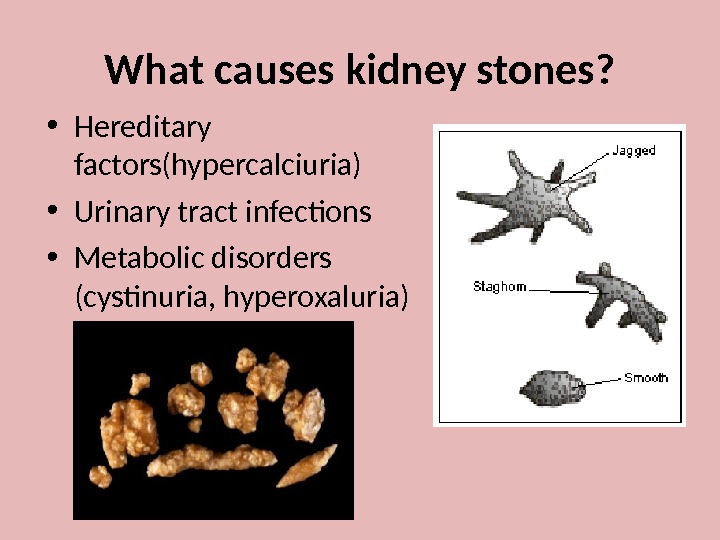
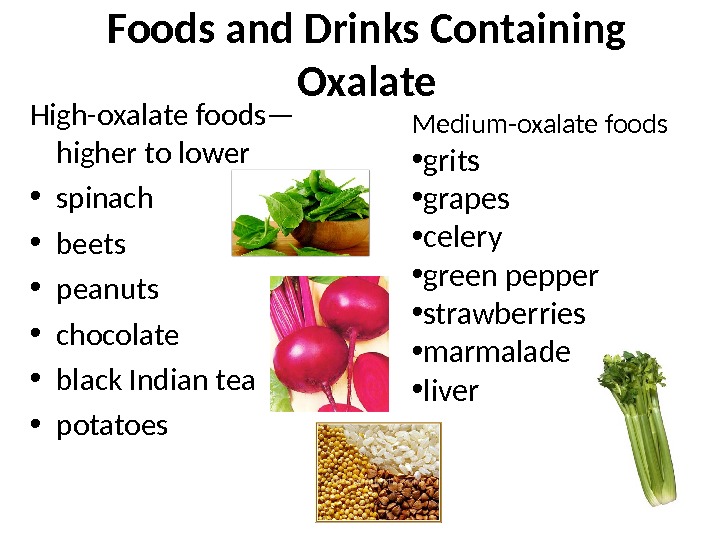
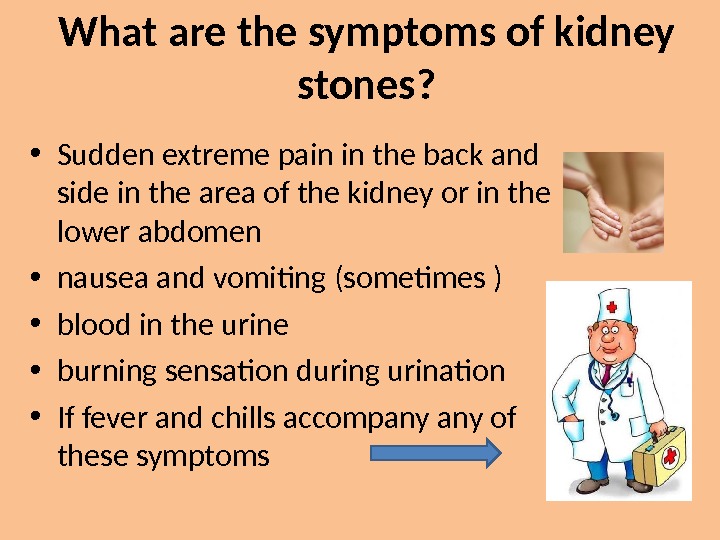
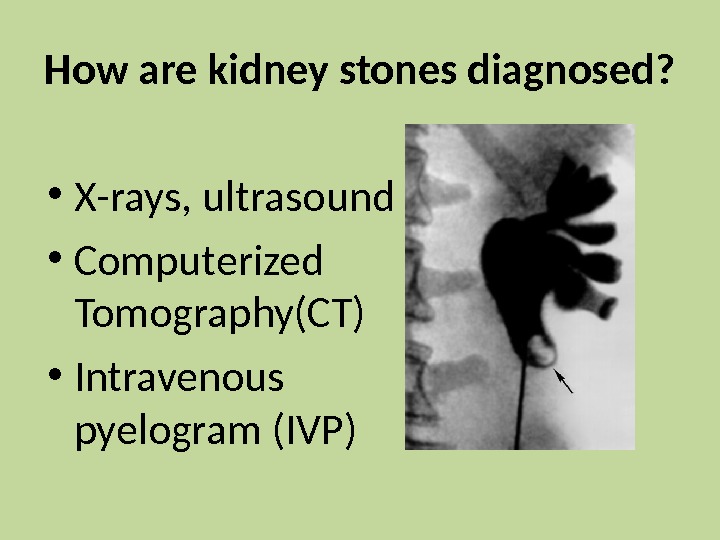
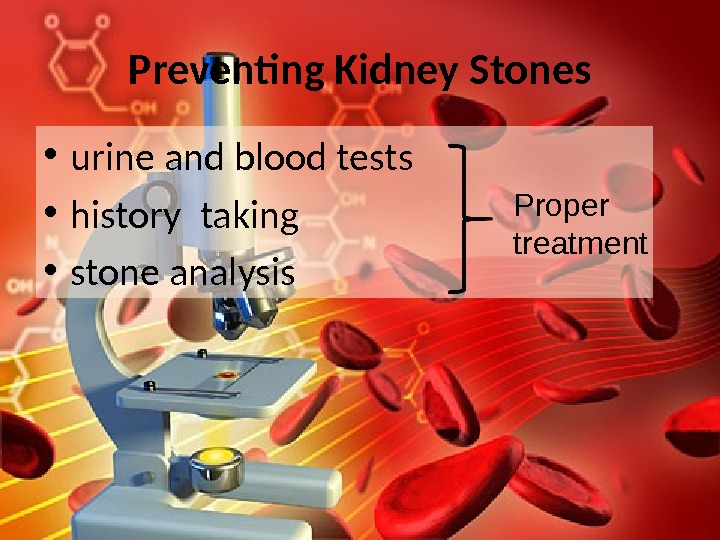

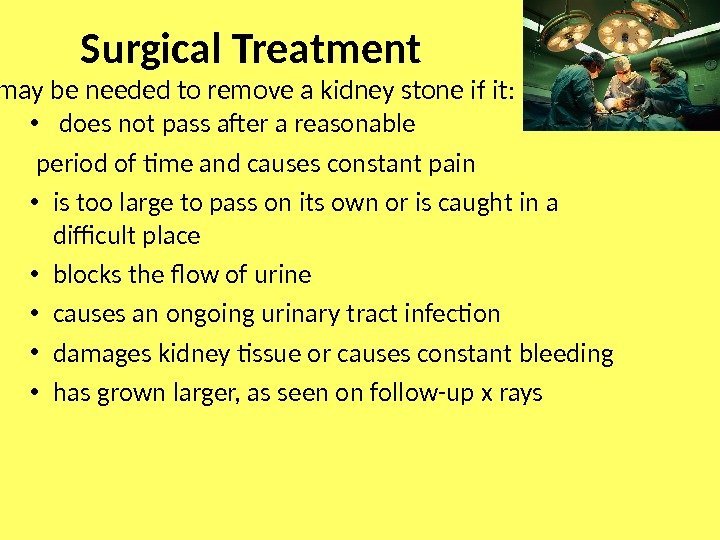
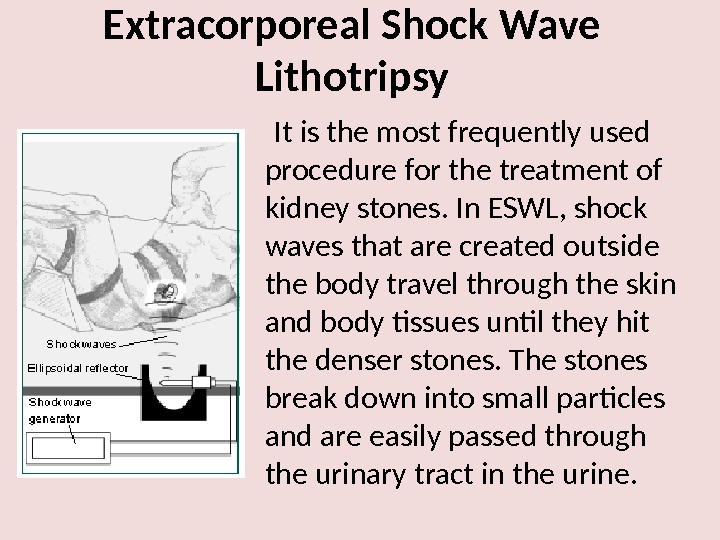
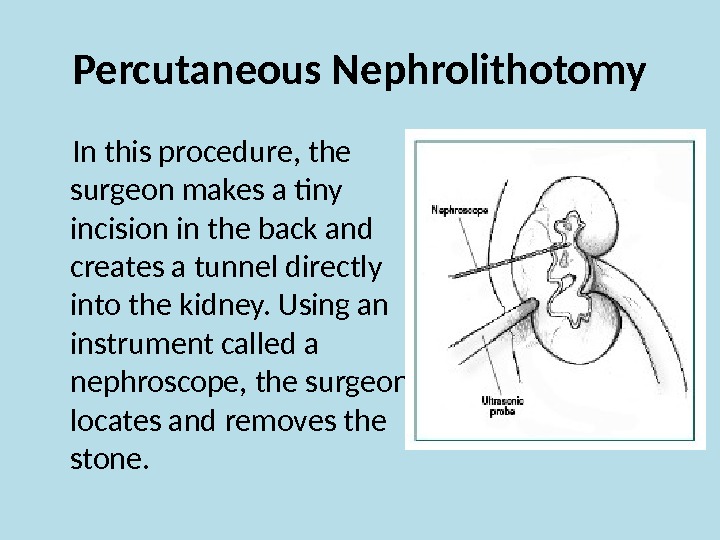
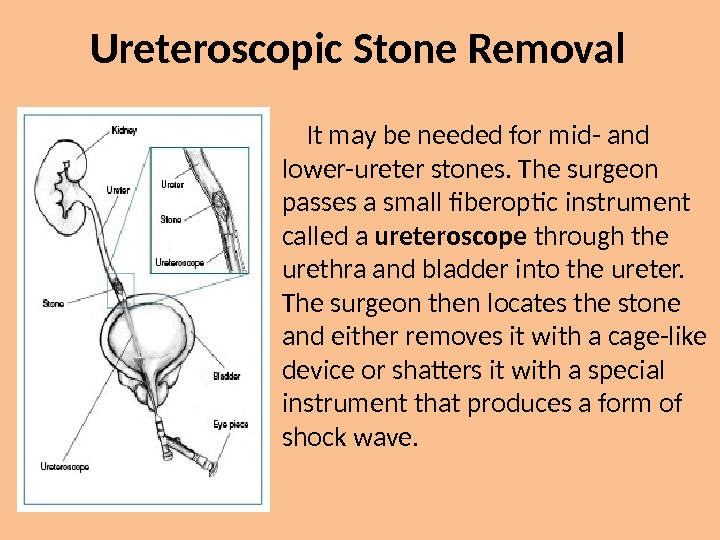

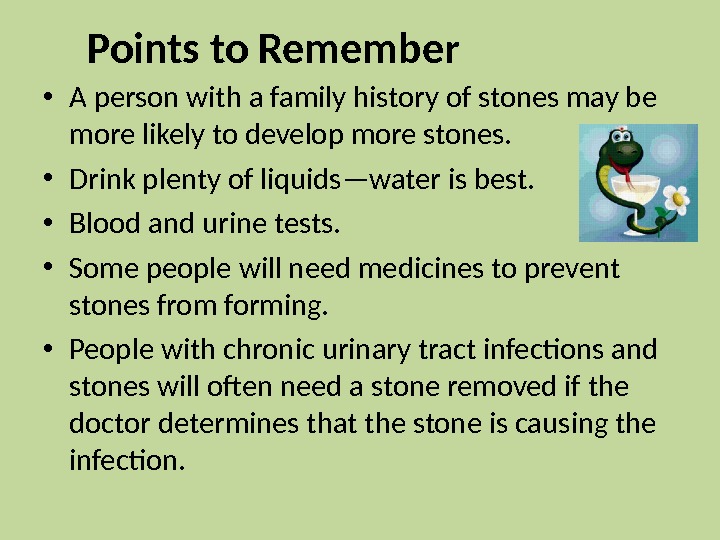

- Размер: 5.2 Mегабайта
- Количество слайдов: 17
Описание презентации Kidney Stones in Adults and Ways of Their по слайдам
 Kidney Stones in Adults and Ways of Their Treatment
Kidney Stones in Adults and Ways of Their Treatment
 Who gets kidney stones? The persent of people in the Russian Federation with kidney stones — 10 -15% The prevalence of kidney stones rises in people from 20 to 50 years
Who gets kidney stones? The persent of people in the Russian Federation with kidney stones — 10 -15% The prevalence of kidney stones rises in people from 20 to 50 years
 Introduction to the Urinary Tract The urinary tract, or system, consists of : kidneys ureters bladder urethra
Introduction to the Urinary Tract The urinary tract, or system, consists of : kidneys ureters bladder urethra
 What is a kidney stone? It is a hard mass developed from crystals that are made from the urine within the urinary tract. The most common type of stone contains calcium in combination with either oxalate or phosphate
What is a kidney stone? It is a hard mass developed from crystals that are made from the urine within the urinary tract. The most common type of stone contains calcium in combination with either oxalate or phosphate
 What causes kidney stones? • Hereditary factors(hypercalciuria) • Urinary tract infections • Metabolic disorders (cystinuria, hyperoxaluria)
What causes kidney stones? • Hereditary factors(hypercalciuria) • Urinary tract infections • Metabolic disorders (cystinuria, hyperoxaluria)
 Foods and Drinks Containing Oxalate High-oxalate foods— higher to lower • spinach • beets • peanuts • chocolate • black Indian tea • potatoes Medium-oxalate foods • grits • grapes • celery • green pepper • strawberries • marmalade • liver
Foods and Drinks Containing Oxalate High-oxalate foods— higher to lower • spinach • beets • peanuts • chocolate • black Indian tea • potatoes Medium-oxalate foods • grits • grapes • celery • green pepper • strawberries • marmalade • liver
 What are the symptoms of kidney stones? • Sudden extreme pain in the back and side in the area of the kidney or in the lower abdomen • nausea and vomiting ( sometimes ) • blood in the urine • burning sensation during urination • If fever and chills accompany of these symptoms
What are the symptoms of kidney stones? • Sudden extreme pain in the back and side in the area of the kidney or in the lower abdomen • nausea and vomiting ( sometimes ) • blood in the urine • burning sensation during urination • If fever and chills accompany of these symptoms
 How are kidney stones diagnosed? • X — rays, ultrasound • Computerized Tomography(CT) • Intravenous pyelogram (IVP )
How are kidney stones diagnosed? • X — rays, ultrasound • Computerized Tomography(CT) • Intravenous pyelogram (IVP )
 Preventing Kidney Stones • urine and blood tests • history taking • stone analysis Proper treatment
Preventing Kidney Stones • urine and blood tests • history taking • stone analysis Proper treatment
 Medical Therapy A doctor may prescribe certain medications to help prevent and to treat calcium and uric acid stones. • Allopurinol • Diuretics(hydrochlorothiazide) • Thiola and Cuprimine • Acetohydroxamic acid (AHA) with long-term antibiotic medicines
Medical Therapy A doctor may prescribe certain medications to help prevent and to treat calcium and uric acid stones. • Allopurinol • Diuretics(hydrochlorothiazide) • Thiola and Cuprimine • Acetohydroxamic acid (AHA) with long-term antibiotic medicines
 Surgical Treatment • does not pass after a reasonable period of time and causes constant pain • is too large to pass on its own or is caught in a difficult place • blocks the flow of urine • causes an ongoing urinary tract infection • damages kidney tissue or causes constant bleeding • has grown larger, as seen on follow-up x rays may be needed to remove a kidney stone if it :
Surgical Treatment • does not pass after a reasonable period of time and causes constant pain • is too large to pass on its own or is caught in a difficult place • blocks the flow of urine • causes an ongoing urinary tract infection • damages kidney tissue or causes constant bleeding • has grown larger, as seen on follow-up x rays may be needed to remove a kidney stone if it :
 Extracorporeal Shock Wave Lithotripsy It is the most frequently used procedure for the treatment of kidney stones. In ESWL, shock waves that are created outside the body travel through the skin and body tissues until they hit the denser stones. The stones break down into small particles and are easily passed through the urinary tract in the urine.
Extracorporeal Shock Wave Lithotripsy It is the most frequently used procedure for the treatment of kidney stones. In ESWL, shock waves that are created outside the body travel through the skin and body tissues until they hit the denser stones. The stones break down into small particles and are easily passed through the urinary tract in the urine.
 Percutaneous Nephrolithotomy In this procedure, the surgeon makes a tiny incision in the back and creates a tunnel directly into the kidney. Using an instrument called a nephroscope, the surgeon locates and removes the stone.
Percutaneous Nephrolithotomy In this procedure, the surgeon makes a tiny incision in the back and creates a tunnel directly into the kidney. Using an instrument called a nephroscope, the surgeon locates and removes the stone.
 Ureteroscopic Stone Removal It may be needed for mid- and lower-ureter stones. The surgeon passes a small fiberoptic instrument called a ureteroscope through the urethra and bladder into the ureter. The surgeon then locates the stone and either removes it with a cage-like device or shatters it with a special instrument that produces a form of shock wave.
Ureteroscopic Stone Removal It may be needed for mid- and lower-ureter stones. The surgeon passes a small fiberoptic instrument called a ureteroscope through the urethra and bladder into the ureter. The surgeon then locates the stone and either removes it with a cage-like device or shatters it with a special instrument that produces a form of shock wave.
 Lifestyle Changes • drink more liquids • avoid products with high calcium content • eat less meat, fish, and poultry
Lifestyle Changes • drink more liquids • avoid products with high calcium content • eat less meat, fish, and poultry
 Points to Remember • A person with a family history of stones may be more likely to develop more stones. • Drink plenty of liquids—water is best. • Blood and urine tests. • Some people will need medicines to prevent stones from forming. • People with chronic urinary tract infections and stones will often need a stone removed if the doctor determines that the stone is causing the infection.
Points to Remember • A person with a family history of stones may be more likely to develop more stones. • Drink plenty of liquids—water is best. • Blood and urine tests. • Some people will need medicines to prevent stones from forming. • People with chronic urinary tract infections and stones will often need a stone removed if the doctor determines that the stone is causing the infection.
 Thank you for attention! The presentation was made by Petrova A. I. , student of 240 gr. Supervisor: Galfanovich I. L.
Thank you for attention! The presentation was made by Petrova A. I. , student of 240 gr. Supervisor: Galfanovich I. L.

